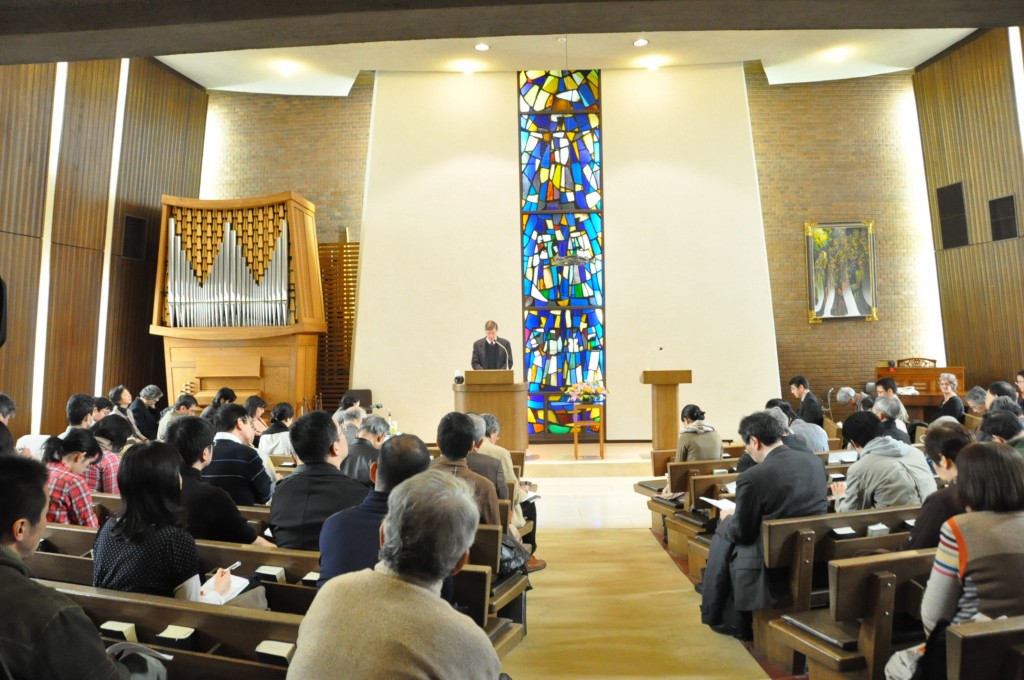Center for Interdisciplinary Study of Monotheistic Religions(CISMOR)Doshisha University
> Public Lectures > “Monotheism and the Redefinition of Divinity in Ancient Israel”Public Lectures
Public Lectures
“Monotheism and the Redefinition of Divinity in Ancient Israel”
| Date: |
2012/12/15 13:00− 15:00 |
|---|---|
| Place: | Divinity Hall Chapel, Imadegawa Campus, Doshisha University |
| Lecture: |
Prof. Dr. Mark S. Smith (Skirball Professor of Bible and Ancient Near Eastern Studies, Skirball Department of Hebrew and Judaic Studies, New York University) |
| Summary: | |
|
Generally, monotheism is defined as belief in only one god, which is considered to be characteristic of ancient Israel. In the Bible, the monotheistic tradition can be traced back to Moses’ Ten Commandments, “You shall have no other gods before me” (Exodus 20:3, Deuteronomy 5:7). However, Professor Mark S. Smith argued that many biblical scholars have placed too much emphasis on the denial of any gods above Yahweh in the early monotheism in the Bible. The term “monotheism” is considered to have been coined by Henry More in his book written in 1660. The term “polytheism” has a much longer history—it is generally accepted that the term was originally invented by Philon Alexandrinus and introduced in the modern vocabulary by Jean Bodein in France in 1580 to discuss the issue of atheism. The concept of monotheism has contributed to the academic effort to categorize religions, which were classified into various forms according to the type of god, and each religious form was given relative value and importance. Among them, monotheism has been considered the best form of religion. In recent years, however, this approach has been called into question, and Professor Smith indicated seven reasons for this tendency. First, the term “monotheism” is neither a Biblical word nor an ancient Middle Eastern word. This word is an anachronism, coined in the modern era. In the field of Biblical study, some anachronistic words are intentionally used to facilitate an approach toward the understanding of ancient civilizations and to critically analyze the gap and difference in contexts between the modern era and ancient times. The use of these words is also instrumental to distinguish between the understanding of ancient civilization itself (called “emic” by anthropologists) and the modern interpretation of such understanding (“etic”). Second, the term “monotheism” has been used to champion the superiority of Western religions, especially Christianity. Monotheism, as a discourse, arose as rhetoric for an argument against the polytheism of ancient Israelite society and other communities. Third, the concepts of “monotheism” and “polytheism” are contrasted with each other in ancient data sources too excessively. The reality is that ancient polytheistic religions have some monotheistic quality, while monotheistic religions have some polytheistic quality. Fourth, sufficient consideration has not been given to the reality of God and the social and political circumstances in which the faith is practiced. Monotheism should not be depicted as a superior ideology or as something to be admired, but it should be understood in a broader religious and cultural context in a manner that facilitates more in-depth comprehension of the reality and the social and religious circumstances in which the faith is practiced. Fifth, monotheism is difficult to define. It has been understood as a religious creed and a “noble ideology,” and these qualities characterize the monotheistic tradition. Sixth, the prevailing notion that ancient Israelites were a truly monotheistic people is not correct because of Israel’s polytheistic background. The denial of this notion has growing influence in recent debates on this matter. Seventh, while it is claimed that the Bible contains some monotheistic descriptions, is it really so? The validity of the term “monotheistic” has been called into serious question, and this term has only limited significance. Biblical monotheism can be thought to have emerged in response to the rise of the imperial monotheism of the Neo-Assyrian Empire and the Neo-Babylonian Empire. In light of the above discussion, the following conclusion can be reached. Israelite monotheism not only redefined the profile of Yahweh-El, an older, traditional god, but also redefined divinity itself. Today, ancient Israelites are thought to have worshipped only one God, and all the other gods are now disregarded. The sun, moon, stars, and angels lost their status as lower-class gods, and the cosmic waters are no longer considered sacred. All of them are now regarded as creations of God, and as non-divine, simply illusionary beings, having nothing to do with Yahweh. The descriptions in the Bible constitute the reality of an only God. This does not mean simply conferring the designation of god and all divine powers on only one God. The superiority of God does not lie in His diverse characteristics. Compared to the earlier interpretation, the Biblical God came to have greater superiority and more human-like qualities than other gods. In this light, the world of ancient Israelite gods could have underwent a revolutionary change, which means not that all divine roles and functions were simply concentrated on one God, but that their characteristics and human-like roles were expanded into a wide range of fields. (Yasuhiko Sato, Research Assistant, Graduate Student of School of Theology, Doshisha University) |
|
|
*This lecture will be given in English. *Admission Free, No Reservation Necessary. Hosted by: CISMOR Co-hosted by: School of Theology, Doshisha University |
|
|
Program(Japanese) |
|

